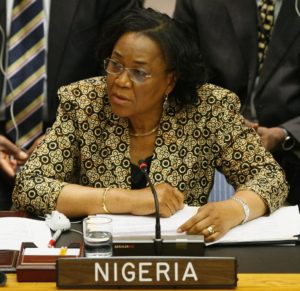
Nigerian UN Ambassador Professor Joy Ogwu (Nigerian Daily Post, 2015)
Nigeria’s oil spill nightmare is nearly over. The nation has revealed a billion dollar clean up plan to address the rampant oil spills in Ogoniland. This comes after decades of neglected oil spills in the area and a 2011 report from the United Nations Environmental Program calling the devastation “ongoing, widespread and severe.”
What’s been described as the most wide-ranging and long-term oil clean-up plan in history was launched in Nigeria Thursday to restore hundreds of square miles of Delta swamps ravaged by nearly sixty years of oil extraction and spills.
The move to restore Ogoniland, located in southern Nigeria and home to more than 800,000 people, comes a year and a half after Shell agreed to an $84 million settlement with residents for two massive oil spills in 2008 and 2009. By then Nigeria had asked the United Nations Environmental Program (UNEP) to study the area. UNEP released a report in 2011 noting oil impacts on Ogoniland are ongoing, widespread, and severe. In turn, Nigeria, Africa’s largest oil producer, started a $1 billion restoration plan this week to clean up decades of spills by Shell and other companies, including the state-owned company.
It will be at least 18 months before full remedial work starts, the Guardian reports. Some $200 million will be spent annually for five years to clean up 1,000 square miles — an area about the size of Rhode Island– though more money may be needed to fully restore the ecosystem.
“The people of Ogoniland have paid a high price for the success of Nigeria’s oil industry, enduring a toxic and polluted environment for decades,” said Achim Steiner, UNEP’s executive director, in a statement. “Today marks a historic step toward improving the situation of the Ogoni people, who have paid this high price for too long.”
Ogoniland is situated in the Niger Delta region, the third largest mangrove ecosystem in the world. Oil was first discovered there in the 1950s and Shell operated in Ogoniland from around 1958 to 1993, when production stopped following a series of environmental protests led by the writer Ken Saro-Wiwa who criticized the destructive impact of the oil industry. Saro-Wiwa was convicted and hanged in 1995. While oil has not been produced in Ogoniland for more than two decades, spills from illegal, aging, and poorly maintained refining infrastructure continue.
Read more here.


